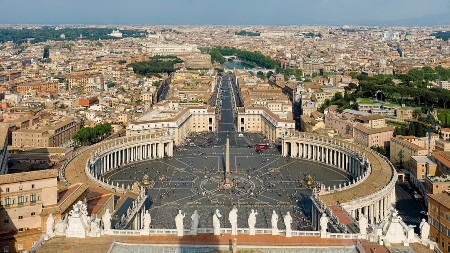We ask you, urgently: don’t scroll past this
Dear readers, Catholic Online was de-platformed by Shopify for our pro-life beliefs. They shut down our Catholic Online, Catholic Online School, Prayer Candles, and Catholic Online Learning Resources—essential faith tools serving over 1.4 million students and millions of families worldwide. Our founders, now in their 70's, just gave their entire life savings to protect this mission. But fewer than 2% of readers donate. If everyone gave just $5, the cost of a coffee, we could rebuild stronger and keep Catholic education free for all. Stand with us in faith. Thank you.Help Now >
Pope: Authority and Reason have God as Source
FREE Catholic Classes
Pope Benedict XVI contends reason leads toward truth and is 'constantly open to conversion.'
Highlights
VATICAN CITY (AsiaNews) - Authority and reason can never been in contrast, because they both have the same source in divine wisdom revealed in the Sacred Scripture of God. Therefore without rigorous analysis of the biblical text and openness to conversion true comprehension of what God gifted man is not possible. That summarizes the thoughts of St John Scotus Erigena, a "notable thinker" of Western Christianity, illustrated today in his general audience by Benedict XVI to 15 thousand people present in St Peter's Square.
Born in Ireland in the early '800's, "we do not know when he left his homeland to cross the channel" to become part of the Carolingian renaissance of the IX century, as a member of the court of Charles the Bald. He died circa 870. Scotus had an intimate knowledge of both the Greek and Latin Patristic culture: Augustine, Ambrose, Gregorius Magnus but also Origin, John Chrysostom and other Church fathers. He had a particular love for the writings of Dionysius, who was an "eminent source of his thought", so much so "that still today in some passages it is hard to tell which thoughts are Scotus' and which Dionysius', whose works he translated from Latin, resulting in their being known".
His "own theological works did not meet with much success", because of the decline of the Carolingian era and a "ecclesiastic censure" born of the fact that "at times he comes close to a Pantheistic Vision, even if his intentions were always orthdox". However in his works there are "stimulating theological and spiritual issues" still valid today.
His writings are important above all for what "is presented as auctoritas" and for highlighting the need to "constantly search for truth". "He is convinced that authority and reason can never be in contrast with one another" and that "true religion and true philosophy coincide. In this sense, he wrote, 'any form of authority that is not confirmed by true reason should be considered weak. It is not, in fact, real authority if it does not coincide with that truth discovered in the power of reason, even if it is a recommended authority transmitted for the use of the successors of the Church Fathers', and he warned: 'no authority should ever distract you from what helps you understand the persuasion or true rational contemplation. In fact authentic authority never contradicts true reason neither can the latter ever contradict true authority. Both, without doubt, originate from the same source that is divine wisdom'. Therefore - underlined the Pope - we see the courage of reason that results in the certainty that true authority is reasonable, because God is the creator of reason".
God gave us Scripture which "would not have been necessary, had mankind been without sin", "we can deduce that God gifted Scripture with pedagogical intent, so man could remember that which the fall had caused him to forget" and that "the Word helps us to remember that which, in the image of God, we carry in our hearts". From this "we can trace some consequences in interpretation that are still valid today".
"The Word glorifies our partially blind reason" and through it "reason opens up to a safe path towards truth" by being "constantly open to conversion", because "only thanks to constant purification of the eye, heart and mind can we conquer true comprehension". "This path brings the intelligent creature to the very portal of the divine mystery" and the "adoring and silent recognition of the mystery reveals itself to be the only path to a real relationship with the truth that is intimate piety and respect for diversity".
"Theological thought is the most obvious demonstration of an attempt to express the mystery of God that cannot be deciphered", "the many metaphors" used by Scotus "illustrate his awareness of the inadequacy of the terms we use to speak of these things. Despite this the mystic experience remains" and the "beauty we discover in these texts". Recalling the affirmations of the Irish Theologian, for whom "we must desire the joy of the truth that is Christ, and nothing more" and "the greatest torment for a rational creature is His absence. These are words - concluded Benedict XVI - that we can make our own and which constitute our hearts deepest desire".
Join the Movement
When you sign up below, you don't just join an email list - you're joining an entire movement for Free world class Catholic education.

-

-
Mysteries of the Rosary
-
St. Faustina Kowalska
-
Litany of the Blessed Virgin Mary
-
Saint of the Day for Wednesday, Oct 4th, 2023
-
Popular Saints
-
St. Francis of Assisi
-
Bible
-
Female / Women Saints
-
7 Morning Prayers you need to get your day started with God
-
Litany of the Blessed Virgin Mary
Daily Catholic
 Daily Readings for Thursday, January 16, 2025
Daily Readings for Thursday, January 16, 2025 St. Fursey: Saint of the Day for Thursday, January 16, 2025
St. Fursey: Saint of the Day for Thursday, January 16, 2025 Prayer for a Blessing on the New Year: Prayer of the Day for Tuesday, December 31, 2024
Prayer for a Blessing on the New Year: Prayer of the Day for Tuesday, December 31, 2024- Daily Readings for Wednesday, January 15, 2025
- St. Paul the Hermit: Saint of the Day for Wednesday, January 15, 2025
- St. Theresa of the Child Jesus: Prayer of the Day for Monday, December 30, 2024
![]()
Copyright 2024 Catholic Online. All materials contained on this site, whether written, audible or visual are the exclusive property of Catholic Online and are protected under U.S. and International copyright laws, © Copyright 2024 Catholic Online. Any unauthorized use, without prior written consent of Catholic Online is strictly forbidden and prohibited.
Catholic Online is a Project of Your Catholic Voice Foundation, a Not-for-Profit Corporation. Your Catholic Voice Foundation has been granted a recognition of tax exemption under Section 501(c)(3) of the Internal Revenue Code. Federal Tax Identification Number: 81-0596847. Your gift is tax-deductible as allowed by law.






 Daily Readings for Thursday, January 16, 2025
Daily Readings for Thursday, January 16, 2025 St. Fursey: Saint of the Day for Thursday, January 16, 2025
St. Fursey: Saint of the Day for Thursday, January 16, 2025 Prayer for a Blessing on the New Year: Prayer of the Day for Tuesday, December 31, 2024
Prayer for a Blessing on the New Year: Prayer of the Day for Tuesday, December 31, 2024


